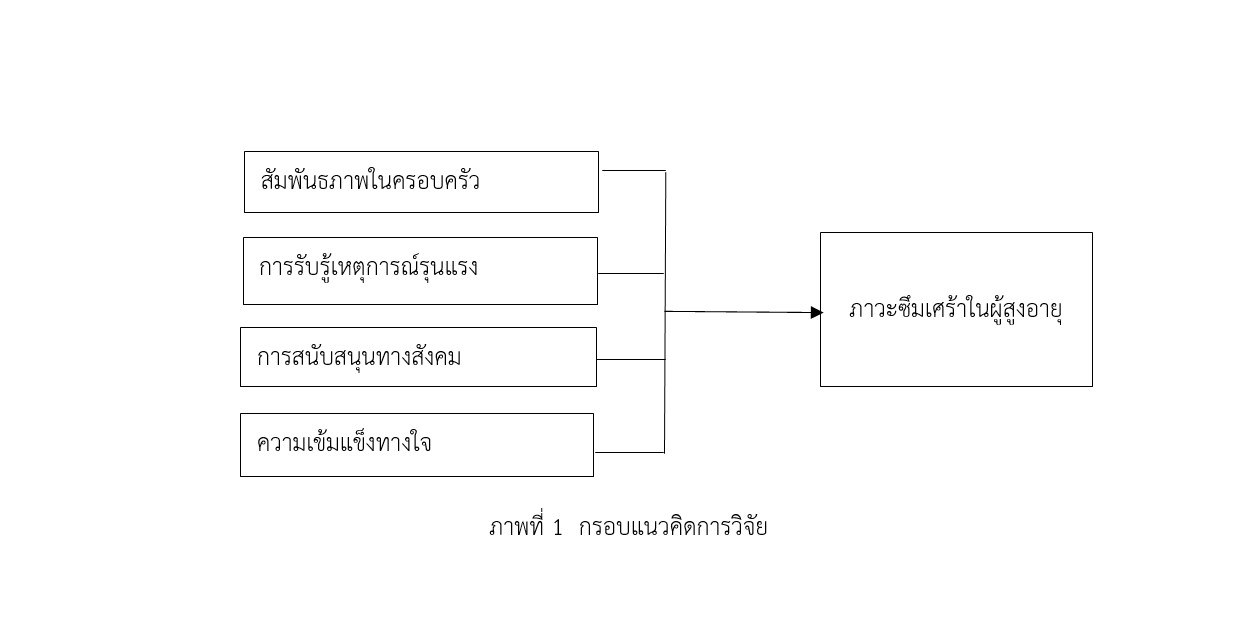ปัจจัยที่มีอิทธิพลต่อภาวะซึมเศร้าของผู้สูงอายุในพื้นที่เหตุการณ์รุนแรง จังหวัดปัตตานี
คำสำคัญ:
ภาวะซึมเศร้าในผู้สูงอายุ , การรับรู้เหตุการณ์รุนแรง , ความเข็มแข็งทางใจบทคัดย่อ
ภาวะซึมเศร้าในผู้สูงอายุเป็นปัจจัยสำคัญที่ส่งผลกระทบต่อคุณภาพชีวิตของผู้สูงอายุการศึกษานี้มีวัตถุประสงค์เพื่อศึกษาปัจจัยที่มีอิทธิพลต่อภาวะซึมเศร้าของผู้สูงอายุในพื้นที่เหตุการณ์รุนแรง จังหวัดปัตตานี กลุ่มตัวอย่างจำนวน 155 คน ได้มาโดยวิธีการสุ่มแบบหลายขั้นตอนและมีคุณสมบัติตรงตามงานวิจัยกำหนด เครื่องมือที่ใช้ในการเก็บรวบรวมข้อมูล ได้แก่ 1) แบบสัมภาษณ์ทดสอบสภาพสมองเบื้องต้น 2) แบบสัมภาษณ์ข้อมูลส่วนบุคคล 3) แบบสัมภาษณ์ภาวะซึมเศร้า 4) แบบสัมภาษณ์สัมพันธภาพในครอบครัว 5) แบบสัมภาษณ์การรับรู้เหตุการณ์รุนแรง 6) แบบสัมภาษณ์การสนับสนุนทางสังคม และ 7) แบบสัมภาษณ์ความเข้มแข็งทางใจ ได้ค่าสัมประสิทธิ์แอลฟาครอนบาคของแบบสัมภาษณ์ในส่วนที่ 2-7 อยู่ระหว่าง .08-.89 วิเคราะห์ข้อมูลด้วยสถิติเชิงพรรณนา และการวิเคราะห์ถดถอยพหุคูณแบบขั้นตอน
ผลการวิจัยพบว่า กลุ่มตัวอย่างมีภาวะซึมเศร้าระดับสูง ร้อยละ 75.5 ปัจจัยที่สามารถทำนายภาวะซึมเศร้าของกลุ่มตัวอย่าง ได้แก่ การรับรู้เหตุการณ์รุนแรง (β = .349, p <.001) และความเข้มแข็งทางใจ (β = .203, p <.05) โดยสามารถร่วมกันทำนายภาวะซึมเศร้าของกลุ่มตัวอย่างได้ร้อยละ 18.7 (R2 = .187, p <.05) ซึ่งแสดงให้เห็นว่า การรับรู้เหตุการณ์รุนแรงและความเข้มแข็งทางใจเป็นตัวแปรที่มีอิทธิพลต่อภาวะซึมเศร้าของผู้สูงอายุในพื้นที่เหตุการณ์รุนแรง ดังนั้นพยาบาลวิชาชีพ บุคลากรด้านสุขภาพที่ดูแลเกี่ยวกับผู้สูงอายุควรให้ความสำคัญในด้านจิตใจ โดยคำนึงถึงปัจจัยดังกล่าวเพื่อส่งเสริมสุขภาพจิตและป้องกันภาวะซึมเศร้าในผู้สูงอายุ
เอกสารอ้างอิง
Beck, A. T., Rush, A. J., Shaw, B. F., & Emery, G. (1997). Cognitive therapy of depression. New York: The Guilford Press.
Boonbunjob, U., & Dangdomyouth, P. (2018). The effect of family-involved resilience promoting program on depression In older persons with major depressive disorder. Nursing Science Chulalongkorn University, 30(2), 110-123.
Boonsiri, A. (2016). Livelihoods of families affected by the unrest in the special deverloment region, Southern border. Songkhla case study. Since 2004 -2013. Humanities and Social Sciences, Thaksin University, 11(1), 238-254.
Boonyamalik, P., Suksawang, S., Swangwongsin, S., & Narakornpijit, K. (2012). The development and validity testing of assessments for preventing and resolving violence in vocational students. Psychiatr Assoc Thailand, 57(1), 1-18.
Brain Rehabilitation Group. (1993). Thai mental state examination test (TMSE). Sarasiriraj, 45(6), 359-374.
Chantarawongsa, C. (2015). Social support, person-environment fit, and work engagement: A case study of a flight attendant in one airline company. Master’s Thesis, Iindustrial and Organizational Psychology, Graduate School, Thammasat University.
Friedman, M. M. (1986). Family nursing: Theory and assessment. New York: Appiton-Century Craftes.
Ganatra, H. A., Zafar, S. N., Qidwai, W., & Rozi, S. (2008). Prevalence and predictors of depression among the elderly population of Pakistan. Aging Mental Health, 12(3), 349-356.
Hollifeld, M., Eckert, V., Warner, T. D., Jenkins, J., Krakow, B., Ruiz, J., & Westermeyer, J. (2005). Development of an inventory for measuring war-related events in refugees. Comprehensive Psychiatry, 46(1), 67-80.
Jitaree, B. (2012). The factors influencing depression among the elderly at a community in Nakhon Pathom province. Master’s Thesis, Community Nurse Practitioner, Christian University.
Jitpiromsri, S. (2017). Conflicts on the southern border in 13 years: The complexity of the field of violence and the power of the Pattani. Retrieved from https://www.deepsouth watch.org/node/11053
Kitikulthanan, P. (2019). The relationships between gender, activities of daily living, resilience, and social support and depression among older persons. Psychiatric Nursing and Mental Health, 33(2), 137-155.
Khongphaisansophon, A., & Soonthornchaiya R. (2016). Factors related to resilience among older persons with major depressive disorder. Psychiatric Nursing and Mental Health, 30(2), 127-142.
Maneerat, S. (2011). Development and psychometric evaluation of Thai elderly resilience scale. Doctoral Dissertation, Nursing Science, Prince of Songkla University, Songkla.
Morrow, P. M., & Wilson, R. C. (1961). Family relationship of bright high-achieving and underachieving high school boy. Child Development, 32(3), 501-510.
North, C. S., Nixon, S. J., Shariat, S., Mallonee, S., McMillen, J. C., Spitznagel, E. L., & Smith, E. M. (1999). Psychiatric disorders among survivors of the Oklahoma city bombing. Journal of American Medical, 282(8), 755-762
Polit D. F., & Beck C. T. (2017). Nursing research generating and assessing evidence for nursing practice (9th ed.). Philadelphia, PA: Lippincott, Williams & Wilkins.
Ratnatilaka Na Bhuket, P. (2013). From problems to policy: A case study of the elderly in Southern border provinces. Romphruek Journal Krirk University, 31(3), 1-26.
Sanitlou, N., Sartphet, W., & Naphaarrak, Y. (2019). Sample size calculation using G*POWER program. Suvarnabhumi Institute of Technology (Humanities and Socal Sciences), 5(1), 496-507.
Suksawat, J. (2011). Collective violence due to insurgency, coping, and happiness of undergraduate students living in the five Southern border provinces of Thailand: A mixed methods. Doctoral Dissertation, Psychology, faculty of Psychology, Chulalongkorn University.
Srisaenpang P. (2018). Depression in older persons: Comprehensive nursing. Nursing Science and Health, 41(1), 129-140.
Stuart, G. W. (2014). Principles and practice of psychiatric nursing (10th ed.). London: Elsevier Health Sciences.
United Nations. (2018). World population prospects the 2017 revision volume I: Comprehensive tables. Retrieved from http://www.un.org/en/development/desa /population
Vichit, C. (2021). Prevalence and associated factors of depression among the elderly living in Phonphisai district, Nongkai province. Primary Health Care Journal (Northeastern Edition), 36(1), 24-36
Wongpoom, T., Sukying C., & Udomsubpayakul, U. (2011). Prevalence of depression among the elderly in Chiang Mai province. Psychiatr Assoc Thailand, 56(2), 103-116.
World Health Organization [WHO]. (2017). Depression and other common mental disorders: Global health estimates. Geneva: World Health Organization.
Zimet, G. D., Dahlem, N. W., Zimet, S. G., & Farley, G. K. (1988). The multidimensional scale of perceived social support. Journal of Personality Assessment, 52(1), 30-41.

ดาวน์โหลด
เผยแพร่แล้ว
รูปแบบการอ้างอิง
ฉบับ
ประเภทบทความ
สัญญาอนุญาต

อนุญาตภายใต้เงื่อนไข Creative Commons Attribution-NonCommercial-NoDerivatives 4.0 International License.




